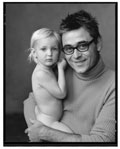By Dr. Michel Cohen
My young patient had been coughing for about a month and a half, and his mother was understandably concerned.
“I’m starting to wonder if it has anything to do with September 11,” she said.
Her comment got me thinking. So far, the EPA and other agencies that have been maintaining a September 11 health registry have found no major health consequences to people living near Ground Zero. Nevertheless, this month marks two and a half years since those tragic events, and many people are still wondering if proximity to ground Zero could have triggered long-term physical health issues.
Since we care for the neighborhood’s kids (4,000 patients) from our office here in the heart of Tribeca, I thought I’d share my perspective on the physical health consequences of September 11, especially on Downtown’s littlest residents.
There are a few major areas of concern. The first is respiratory: People inhaled particles – via dust, smoke, and fumes – that were potentially irritating to the airways. Second, people may have ingested such particles, leading to short-and long-term toxicity. Third, what is the effect of potentially toxic airborne substances on the fetuses of pregnant women?
The repercussions from the fumes of ongoing fires are relatively easy to assess. Asthma is a reliable indicator of airway irritation, because predisposed individuals typically develop it in response to respiratory irritants. A recent study done on asthmatic children attending a clinic in Chinatown reports that their condition was exacerbated in the year after 9/11. I have not seen this study firsthand but do question this research. It may be flawed by the fact that it was limited to one clinic and may not have accounted for factors such as living conditions which are known to play an important role in asthma. For example another recent study also reports staggering increase in the rate of asthma in Harlem which is away from Ground Zero.
Our experience with asthma is radically different. Right after the attacks, despite the emanating fumes, we were surprised to find that our office diagnosed very few asthma attacks in the winter’s unusually mild weather. Asthma is often triggered by viral respiratory illnesses such as colds, coughs, and flu’s, but thanks to good weather, all of these showed up in remarkably low numbers that year. As for long-term repercussions, we also have seen no increased incidence of asthma in our patients since September 11.
Lead is among the toxic compounds people may have inadvertently ingested as dust following the explosions and fires. Here again, in our office we have seen no increase in lead levels, and we routinely test all infants for lead at about one year of age.
Mercury exposure has also been a concern, but I’m happy to report that the few blood samples we’ve taken (at the request of concerned parents) all showed mercury levels below toxicity. Some adults have tested positive for higher blood mercury levels, but this may be caused by older silver dental fillings which release mercury into the bloodstream.
Asbestos, a very fine mineral fiber found in older buildings, can provoke lung cancer many years after being inhaled. It is impossible to measure this substance once it’s in the lungs, so I cannot report how it has affected my patients. However, the EPA has consistently monitored asbestos levels in lower Manhattan’s ambient air since September 11, and it has found no evidence of toxic levels.
Concerning the long-term effects of the explosions and their fallout on fetuses, Mount Sinai Hospital has run a study on about 200 women who were pregnant and living in lower Manhattan at the time of the event. The study, which has several statistical limitations, has found no more than a small decrease in the average birth weight.
The trend is certainly not evident in our office – we’ve seen plenty of chubby newborns delivered by mothers who were pregnant at the time of the event. We have more than 120 patients who were born six moths after 9/11. And two and a half years later, these children display no specific shared health issues.
So far, I have not seen any physical conditions affecting those kids who were living in the area on September 11, or those who were born to Downtowners a few months later. In the end, my little patient’s cough may be the same lingering, frustrating cough that we see every winter following a string of viral infections…the kind for which time and warmer weather are the best medicines.
Dr. Michel Cohen is a Tribeca pediatrician and author of “The New Basics”: A-to-Z Baby and Child Care Guide for the Modern Parent. Dr. Cohen can be reached via e-mail at his website: www.thenewbasics.com.
Reader Services
































